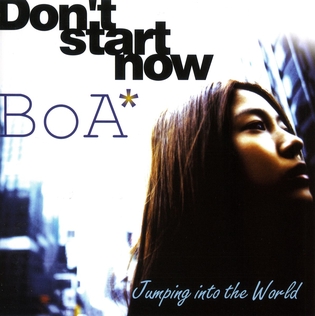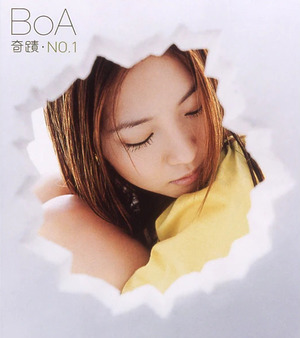
Miracle is the second compilation album by South Korean singer BoA, released through SM Entertainment on September 24, 2002. The album contains Korean versions of BoA's 2002 Japanese songs. The song "Every Heart" was first released in Japan and the Korean version is used as the end theme of anime Inuyasha.

Atlantis Princess is the third Korean studio album by South Korean recording artist BoA, released through SM Entertainment on May 30, 2003. The record spawned three singles, including the Seoul Metropolitan Government promotional single "Lights of Seoul", the title track "Atlantis Princess", and "Milky Way", with accompanying music videos produced for the latter two songs. An overseas version of the album, containing a bonus video CD, was released in several territories in Asia such as the Philippines, Hong Kong and Taiwan.

My Name is the fourth Korean-language studio album by South Korean recording artist BoA, released through SM Entertainment on June 11, 2004. BoA promoted the album with the singles "My Name" and "Spark", the latter of which is a Korean-language cover of "Keep My Cool" (2002) by Luis Fonsi. The album saw BoA's transition into a more mature image in comparison to her previous records.

Girls on Top is the fifth Korean studio album by South Korean recording artist BoA, released through SM Entertainment on June 23, 2005. A repackage of the album, titled Moto, was released on August 17, 2005. The record saw a continuation of BoA's image change that began with her prior album My Name (2004); Girls on Top sought to portray a "mature and self-confident" image with themes expressing female empowerment. In Japan, a special edition of the album including a DVD was released by Avex Trax on March 26, 2008.

No. 1 is the second Korean-language studio album by South Korean recording artist BoA. The album's composition and arrangement was handled by several music collaborators, such as Yoo Young-jin, Kangta, Ahn Ik-soo, Sigurd Heimdal Rosnes, among others. Released through SM Entertainment on April 12, 2002, No. 1 marked BoA's return to South Korea following the release of her debut Japanese album Listen to My Heart a month prior, which saw widespread recognition in Japan.

Listen to My Heart is the debut Japanese studio album by South Korean recording artist BoA, released via Avex Trax on March 13, 2002. BoA worked with a team of songwriters and composers to produce the album, including Natsumi Watanabe, Kazuhiro Hara, Ken Harada and Akira; all of whom would collaborate with BoA again on her future albums. Musically, Listen to My Heart is primarily a pop record with influences from R&B.

Jumping Into the World is the first special album by South Korean singer BoA, released on March 8, 2001. It consisted of eight new tracks along English and Chinese versions of the songs "Don't Start Now", "사라 (SARA)", "ID; Peace B". In Korea, the album was titled Don't Start Now.

ID; Peace B is the debut Korean-language studio album by South Korean singer BoA, released on August 25, 2000 by SM Entertainment. It saw moderate levels of success in South Korea upon its release, peaking at number 16 on the Recording Industry Association of Korea's monthly album chart in October 2000. The album sold 156,354 copies in 2000 and was the 59th best-selling album of the year. The album was released on May 29, 2002 in Japan, where it reached number 30 on the Oricon Albums Chart.

Kim Hyun-jung is a South Korean pop singer. Well known as the "Long-legged singer", and with the experience of performing in a heavy metal band, Kim made her debut as a female solo singer with the dance-infused album Legend. The song "Breakup with Her" was a fast-tempo song with strong beats that shot Kim quickly to the top. The song "Lonely Love" was also a great hit. Since her debut, Kim Hyun-jung has succeeded in releasing great songs, usually dance numbers.

Koyote, also known as KYT is a South Korean co-ed vocal group consisting of members Kim Jong-min, Shin Ji, and Bbaek Ga. The group, which is known for its signature dance and hip hop sound, debuted in 1998 with hit song "Genuine".

The discography of South Korean musician BoA consists of twenty-one studio albums, eight compilation albums, three extended plays (EPs) and numerous singles. BoA debuted as a musician through South Korean talent agency SM Entertainment at the age of 13 with the album ID; Peace B (2000), followed by her debut in Japan with Avex Trax in 2001.

Clazziquai Project (Korean: 클래지콰이), also known as Clazziquai, is a South Korean electropop band that combines several genres including electronic music, acid jazz and house. The band's first short unofficial albums were released online in 2001, spreading its music through words of "netizens," who positively received the band's music. They remained underground until the release of their first album Instant Pig in 2004, selling over 80,000 copies. Since then, their music has been used in shows, commercials, and films.

"Meri Kuri", known in South Korea as "Merry-Chri", is a song recorded in two languages by South Korean singer BoA. A holiday-themed ballad, its lyrics were written by Chinfa Kan and BoA; production was handled by Kazuhiro Hara. It was released on December 1, 2004, as her 14th Japanese single, via Avex Trax; and her 3rd physical Korean single, by SM Entertainment. Both versions are supported with the B-side tracks "Mega Step" and "The Christmas Song". Its music video premiered on her 18th birthday and was shot at the Chapel on the Water and Ochiai Station in Hokkaidō.

This is the discography of South Korean singer Seven.

"No. 1" is a song by South Korean recording artist BoA. It was released on April 12, 2002, for her second studio album of the same name (2002) through SM Entertainment. In Japan, the song was released as a double A-side CD single with the track "Kiseki" on September 19, 2002, via Avex Trax. The single, titled "Kiseki / No. 1", was included in her second Japanese studio album Valenti (2003). "No. 1" was written by Kim Young-ah, while production was handled by Sigurd Røsnes and Ahn Ik-soo.

Rising Sun is the second Korean-language studio album by South Korean boy group TVXQ, released on through SM Entertainment on September 12, 2005. Musicians including Yoo Young-jin, Kenzie, Hwang Sung Je and All-4-One's Jamie Jones took part in the album's songwriting and production. Musically, Rising Sun is primarily a pop album, but also includes tracks that utilize styles such as hip-hop, rock, teen pop, and ballads.

The Wonder Begins is the debut single album by South Korean girl group Wonder Girls, released on February 13, 2007, through JYP Entertainment. It contains the main track "Irony", written and produced by Park Jin-young. The release also contains three additional tracks: "Bad Boy", "It's Not Love", and a remix of "Irony". An accompanying music video for "Irony" features members Sohee, Yeeun, Sunmi and Hyuna getting revenge on Sunye's unfaithful boyfriend by using a voodoo doll to embarrass him. The Wonder Begins is the group's only release that was promoted with member Hyuna, who left the group in July 2007.

Saldaga is the second studio album by South Korean vocal group SG Wannabe, released through Mnet Media on March 23, 2005. The record spawned two number one singles: "Sin and Punishment", which received numerous awards both for the music video and for the song itself, and "Saldaga". Like its predecessor, "Saldaga" was able to attract media attention for the group's vocal ability, thus SG Wannabe became the only artist in 2005 to sell more than 400,000 copies of their album. The album has sold 485,926 copies.

Bad Man, alternately titled N001, is the debut studio album by South Korean pop and R&B singer Rain, released via JYP Entertainment on May 13, 2002. The album was the 45th best-selling album of the year with over 138,000 copies sold. It won Rain various newcomer awards including at the MAMA Awards, Golden Disc Awards and Seoul Music Awards.

The discography of South Korean girl group Jewelry consists of eight studio albums, one extended play, twenty-six singles, and two soundtrack appearances. Formed in 2001, the group debuted with the single "I Love You", and had gone through numerous line-up changes before disbanding in January 2015.




















